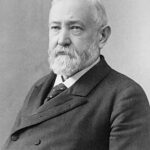The Baltimore Incident Escalates
The Harrison Chilean Crisis began with a tragic bar fight in Valparaíso on October 16, 1891. Two American sailors from the USS Baltimore died in the confrontation. Seventeen others suffered injuries during the violent encounter. President Benjamin Harrison transformed this local incident into a major international crisis. ⚠️ His response would define aggressive presidential overreach in foreign policy.
Presidential Ultimatum and Military Posturing
Harrison demanded immediate Chilean apology and financial reparations for the Baltimore incident. He mobilized naval forces and threatened direct military action against Chile. The president’s ultimatum gave Chile limited time to comply with American demands. 📊 Harrison deployed eight warships to Chilean waters as intimidation tactics. His administration prepared for full-scale war over what critics called a tavern brawl.
Political Motivations Behind the Crisis
Critics accused Harrison of manufacturing the Harrison Chilean Crisis for domestic political gain. The 1892 presidential election approached, and Harrison faced declining popularity. Military posturing against foreign nations often boosted presidential approval ratings. 💰 Economic interests also influenced Harrison’s aggressive stance toward Chilean trade policies. His administration sought to establish American naval dominance in South American waters.
Impact:
Immediate International Consequences
The Harrison Chilean Crisis severely damaged American diplomatic relations throughout South America. 🌍 Chile eventually apologized and paid $75,000 in reparations under military pressure. However, the incident created lasting resentment against American interventionism. Other Latin American nations viewed Harrison’s actions as dangerous precedent for future conflicts. The crisis demonstrated how minor incidents could escalate into major international confrontations.
Constitutional and Legal Ramifications
Congressional leaders criticized Harrison’s unilateral military mobilization without legislative approval. 🔥 The crisis raised serious questions about presidential war powers and constitutional limits. Legal scholars debated whether presidents could threaten war over civilian incidents abroad. Harrison’s actions established concerning precedent for executive branch military interventions. The controversy influenced future debates about presidential authority in foreign policy matters.
Long-term Impact on American Diplomacy
The Chilean Crisis marked a shift toward more aggressive American foreign policy in Latin America. 📉 It foreshadowed later interventionist policies that would characterize early 20th-century diplomacy. Harrison’s brinksmanship tactics became a template for future presidential responses to international incidents. The crisis contributed to growing anti-American sentiment throughout South America that persisted for decades.
